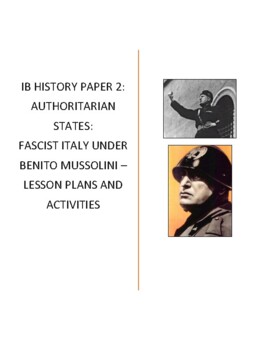IB History Paper 2: Authoritarian States: Mussolini's Italy - Lessons/Activities
- PDF
Also included in
- This Bundle Set includes all of the lessons related to Nazi Germany, Fascist Italy, the People's Republic of China, and the Soviet Union. These lessons are aligned with the IBO's 2017 and 2020 History Guide. These lessons include the following themes: Emergence of an Authoritarian/One-Party State RuPrice $210.60Original Price $234.00Save $23.40
Description
This bundle set of lessons is devoted to IB History Paper 2: Authoritarian States - Fascist Italy under Benito Mussolini. There are six lessons within this bundle set. Each lesson has different activities that enable students to interpret different types of sources - primary and scholarly documents as well as paintings and posters. These lessons are aligned to the IB History Paper 2 standards from the IBO's 2017 and 2020 publication editions.
The following lessons focus on the various topics found on the Paper 2 Authoritarian States section within the IB History examination: Rise to Power; Ideology; Consolidation of Power; and Economic and Social Policies (Domestic Policies).
The lessons are:
1. Italy and the Road to War - this lesson is an overview of the entire unit. It is a documentary in which students will watch and answer questions. (Student Copy; TEACHER ANSWER KEY)
2. The Emergence of Mussolini and Fascism in Italy, 1880 - 1922. This is a source activity in which students, working in groups, will examine the economic, social, political problems within Italy prior to and in the aftermath of the First World War. Graphs, primary sources, and secondary sources are included.
3. Fascist Ideology and Tenets - Connections to Nationalistic and Futuristic Intellectuals. This lesson examines the influences that Italian nationalistic writers (i.e., Corradini) and Futuristic writers, such as the poet Marinetti, had on Mussolini's own writings and on Fascism. This is a compare and contrast lesson activity.
4. Consolidation of Power - 1922 to 1929. This lesson focuses on the methods and measures that Mussolini and the Fascist regime took in order to maintain power. This is a primary source activity that contain speeches and laws.
5. The Fascist Regime and Domestic Policies concerning Women, the Youth, and the Church. This lesson consists of primary and secondary accounts related to the relationship that the regime had with the aforementioned groups. This lesson activity entwines two major concepts: consolidation of power and domestic policies.
6. Mussolini and His Foreign Policy in the Interwar Years, 1923-1939. This can be a project and/or a lesson in which students, working preferably in groups, will examine the different conflicts in which Italy was involved in in the interwar years and the impact that each one of them had on the nation.






